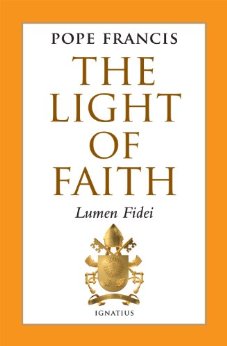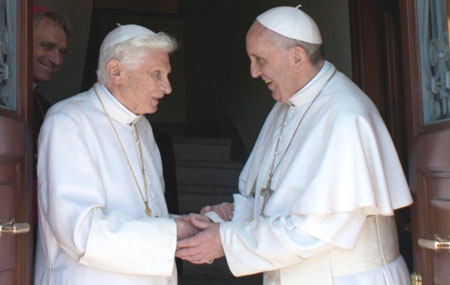
- Encyclical Letter Lumen Fidei of the Supreme Pontiff Francis "Given in Rome, at Saint Peter’s, on 29 June, the Solemnity of the Holy Apostles Peter and Paul, in the year 2013, the first of my pontificate."
- Lumen Fidei - PDF Format
- a broad summary of Pope Francis' first encyclical, “Lumen Fidei" (Vatican Information Service)
- Presentation of the Encyclical, "Lumen Fidei" (Vatican Information Service). A press conference held in the Holy See Press Office, with Cardinal Marc Ouellet, P.S.S., prefect of the Congregation for Bishops, and Archbishops Gerhard Ludwig Muller and Rino Fisichella, respectively prefect for the Congregation for the Doctrine of the Faith and president of the Pontifical Council for New Evangelization.
News and Commentary
- In first encyclical, pope celebrates faith as the light of human life, by Francis X. Rocca. (Catholic News Service). 07/05/13.
- Encyclical illustrates continuity of two papacies, officials say, by Cindy Wooden (Catholic News Service) 07/05/13.
Presenting Pope Francis' new encyclical and acknowledging how much of it was prepared by retired Pope Benedict XVI, top Vatican officials hailed it as a unique expression of the development of papal teaching and unity in faith.
"It is a fortunate coincidence that this text was written, so to speak, by the hands of two popes," said Archbishop Gerhard Muller, prefect of the Congregation for the Doctrine of the Faith, at a news conference July 5 marking the release of "Lumen Fidei" ("The Light of Faith").
"Notwithstanding the differences of style, sensibility and accent, anyone who reads this encyclical will immediately note the substantial continuity of the message of Pope Francis with the teaching of Pope Benedict XVI," the archbishop said. ...
Cardinal Ouellet told reporters, "A pillar was lacking in Benedict XVI's trilogy on the theological virtues" begun with his encyclicals on love and on hope. "Providence willed that this missing pillar should be both a gift from the pope emeritus to his successor and a symbol of unity."
Pope Francis' decision to take up the work begun by Pope Benedict and add some of his own reflections, which he states explicitly in the encyclical, witnesses to their unity in faith, the Canadian cardinal said. "The light of faith is passed from one pontiff to another like a baton in a relay, thanks to 'the gift of the apostolic succession.'"
For Cardinal Ouellet, the encyclical's "shared mode of transmission illustrates in an extraordinary way the most fundamental and original aspect of the encyclical: its development of the dimension of communion in faith," of the importance of believing in and with the church and of living one's faith in solidarity with others.
The text of the finished encyclical, he said, reflects "much of Pope Benedict and all of Pope Francis."
- The Light of Faith" by Four Hands, by Fr. Thomas Rosica. Salt and Light 07/05/13. In order to begin to understand the magnitude of Pope Francis’ first Encyclical, “Lumen Fidei,” we must take into consideration a scene in the Vatican Gardens early this morning which preceded the unveiling of this great papal teaching prepared by “four hands.” ...
- Francis on the "Light of Faith" First responses to 'Lumen Fidei' by Drew Christiansen, Robert P. Imbelli, James Martin, SJ, Peter Folan, S.J., Christiana Z. Peppard. America Magazine. 07/05/13.
- 14 things you need to know about Pope Francis’s new encyclical, by Jimmy Akin. National Catholic Register 07/05/13.
- In first encyclical, Francis reaches out to seekers, by John Allen Jr. National Catholic Reporter 07/05/13.
- Lumen Fidei and Taking the Right Stand, by David Cloutier. dotCommonweal 07/05/13:
If you do not take a stand, you will not understand. Understanding requires standing. These are the culminating themes of the account of the concept of faith in Joseph Ratzinger’s 1968 Introduction to Christianity, in which faith is named as “taking up a position” and “to take one’s stand on something.” Ratzinger is trying to identify faith with a certain type of stance toward reality, rather than with any formulae, claiming that faith is the prerequisite of all real human understanding. Without faith, he suggests, all understanding eventually is reduced to “making” – that is, not to standing somewhere, but to remaking the world in one’s own image. (By “faith” here, I hasten to add that Ratzinger is speaking more broadly that about “the Faith” – he’s showing that understanding is really only possible if there is acknowledgment of meaning in the world that is PRIOR TO my own definitions, and to acknowledge such meaning is to trust, have faith.
Chapter 2 of Lumen Fidei quotes Isaiah 7:9, “Unless you believe, you will not understand,” the very verse on which Ratzinger bases his reflection in his 1968. The hand of Benedict is very much present here, weaving a complex reflection on how love, the senses, and reason all work together in fruitful concert when grounded in faith, a faith that itself must be embodied in the community of the Church (chapter 3) and in service to the common good (chapter 4). ...
- The Encyclical on Faith, by James V. Schall, SJ. Catholic World Report July 7, 2003:
... What struck me about this latest encyclical was how little it addressed itself to current events. It does say that marriage is between one man and one woman for their good and that of the child, but that is nothing new. One would think that a Church that wanted to be “relevant,” with a new Pope, some greater effort would be made to speak of economics and foreign affairs. I can imagine the editorial writers in the world press and media scratching their collective heads trying to figure out how to deal with this obviously important document. They are not used to being told that they cannot explain the condition of their own souls without the faith that addresses itself to the whole of human existence.
I suggest that the encyclical’s purposeful indifference to such things is precisely its point. In the long run, these worldly things are not particularly important if they are not also taken up with the great drama of faith that constitutes salvation history. We cannot explain ourselves by ourselves to ourselves. "Idols exist, we begin to see, as a pretext for setting ourselves at the center of reality and worshiping the work of our own hands. Once man has lost the fundamental orientation that unifies his existence, he breaks down into the multiplicity of his desires…". This encyclical spells out the alternative to the self-centered man. We are not the center of our own reality; yet, we really exist and there is a center.
- You've got to love an encyclical that name-checks Wittgenstein - Peter Bradley. Lex Communis 07/05/13.


No comments:
Post a Comment